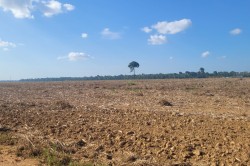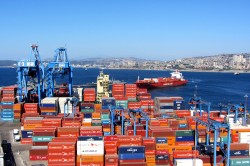press release, 18. April 2024
More sustainability in global agricultural trade
After analysing the value chains of agricultural products, researchers show that trade relations with the EU should be renegotiated
The EU wants to ensure greater sustainability in agricultural trade with the Global South - with the aim of minimising the environmental and climate-damaging effects of importing crops such as soya, palm oil, coffee, and cocoa. However, this aspiration is often not fulfilled in practice. Researchers from the Helmholtz Centre for Environmental Research (UFZ) and the University of Rostock have developed a new approach to identifying options for the sustainable trade of agricultural products and published their findings in One Earth. This approach requires a refined analysis that shows how relevant the individual products are for the EU and the country of origin and what leverage effect they have. The researchers found that over 80% of the land deforested for EU production is used to grow soya, palm oil, cocoa, and coffee.

Photo: Yves Zinngrebe / UFZ

Photo: ©Sebastian Lakner / University of Rostock
Soya, palm oil, coffee, cocoa, sugar, or hazelnuts - in only a few cases is the cultivation in the countries of origin outside Europe truly sustainable. For example, rainforests are cleared and valuable grasslands are used for palm oil and cocoa plantations and soya monocultures, and harmful pesticides are used in the cultivation of cocoa and hazelnuts. In order to prevent negative consequences for biodiversity, ecosystems, and the climate, the EU has expressed its political will to share responsibility for this. It is committed to the principle of Policy Coherence for Development (PCD) in its development policy. Accordingly, it wants to not only achieve the Sustainable Development Goals (SDGs) of the UN within EU boarders, but also support developing countries for implementing them. In the Green Deal and the Farm to Fork Strategy, the EU Commission has committed to promoting the transformation towards sustainable agricultural and food systems.
In order to provide more clarity in the tangled web of complex trade relations between the EU and exporting countries in the market for agricultural products, a research team is now proposing a new approach that analyses both the relevance and leverage effect of individual imported goods for the EU and for the country of origin. The "relevance" criterion describes the proportion of an agricultural product from a country of origin in total imports into the EU. The "leverage" criterion describes how important the proportion of an agricultural product imported into the EU is for the country of origin in the overall value chain or agricultural production. "We can thus describe the importance of trade with the EU for each agricultural product and exporting country and consider measures that could make these trade relations more sustainable", says UFZ environmental policy expert Dr Yves Zinngrebe, lead author of the publication. The team of authors analysed the relevance and leverage effect of the most important agricultural imports for three dimensions: the economic value that these imports have for the country of origin, the footprint as a measure of land consumption for the cultivation of the imported goods, and the deforestation (i.e. how many hectares had to be cleared for the production of the imported goods).
The researchers discovered that soya, palm oil, cocoa, and coffee account for more than 80% of the land deforested for the cultivation of EU products. In addition, based on the high relevance and leverage values, they found that much of the influence of the EU is focussed on a few groups of countries with specific export profiles. These include the MERCOSUR countries of Argentina, Brazil, Paraguay, and Uruguay in particular because trade with these countries (especially in soya) accounts for 22% of the trade value, 33% of the required land area, and 40% of the imported deforestation. These are joined by Malaysia, Indonesia, and Papua New Guinea, which specialise in the cultivation of palm oil as well as a number of countries in Africa, Latin America, and Vietnam, which specialise in cocoa and coffee. "The EU could achieve a great deal if it focused on soya, palm oil, coffee, and cocoa when establishing sustainable trade relations", says Zinngrebe.
The EU also has strong leverage in certain small sugar producer countries. For countries such as Mauritius, Fiji, Barbados, and the Bahamas, the overall relevance for the EU is low. However, the leverage (i.e. the proportion of the cultivation area reserved for EU exports) is quite high (20-40%), providing a strong potential or responsibility of the EU in establishing sustainability standards. The potential leverage effect is also high for countries in Eastern Europe (e.g. Ukraine and Russia) and Central Asia (e.g. Kazakhstan), which sell large quantities of grain to the EU. Cereals such as wheat, maize, and barley as well as oilseed crops such as sunflowers, rapeseed, and linseed account for almost 70% of the imported footprint from these countries. "If the EU hopes to ensure greater sustainability in global food systems, it should use its relationships primarily with trading partners for which the leverage is particularly high", says Prof Sebastian Lakner, agricultural economist at the University of Rostock and final author of the study. "The aim here is to develop new agricultural standards or regulations together with our trading partners, which provide benefits to both the countries of origin and the countries of consumption". The EU supply chain law can play an important role in this. This is intended increase the transparency of the conditions under which traded goods are produced. For example, how much primeval forest has been cleared for an agricultural product or how the land was previously used.
In the case of highly relevant agricultural goods such as soya and palm oil, which together account for almost two thirds of the EU proportion of deforestation in partner countries and one third of the footprint, it is up to the EU to reduce this relevance. For example, it could regulate demand by promoting more sustainable livestock farming or a low-meat diet in the EU. However, examples from the recent past (e.g. palm oil) show how sensitively global trade should be handled. The EU had pushed ahead with regulations for more sustainable cultivation but lost large market shares as a result because other countries such as India and China took over EU proportions of the global market. "The EU thus gambled away parts of its influence because the demand for palm oil continues. It no longer has as much influence on making this trade more sustainable because the proportion of palm oil imported into the EU is no longer as high", says Zinngrebe. This means that the EU no longer has any effective leverage. If the EU truly hopes to implement policy coherence in the interests of development, it must support these countries in developing their economies beyond agriculture to value-adding sustainable production.
Publication:
Yves Zinngrebe, Jurij Berger, Christian Bunn, María R. Felipe-Lucia, Nina Graßnick, Thomas Kastner, Guy Pe’er, Christian Schleyer, Sebastian Lakner (2024): Prioritizing partners and products for the sustainability of the EU’s agri-food trade. One Earth, https://doi.org/10.1016/j.oneear.2024.03.002
Further information
Dr. Yves Zinngrebe
UFZ Department of Conservation Biology & Social-Ecological Systems
yves.zinngrebe@ufz.de
Prof. Dr. Sebastian Lakner
University of Rostock / Faculty of Agricultural and Environmental Sciences
sebastian.lakner@uni-rostock.de
UFZ press office
Susanne Hufe
Phone: +49 341 235-1630
presse@ufz.de
In the Helmholtz Centre for Environmental Research (UFZ), scientists conduct research into the causes and consequences of far-reaching environmental changes. Their areas of study cover water resources, ecosystems of the future, environmental technologies and biotechnologies, the effects of chemicals in the environment, modelling and social-scientific issues. The UFZ employs more than 1,100 staff at its sites in Leipzig, Halle and Magdeburg. It is funded by the Federal Government, Saxony and Saxony-Anhalt.
www.ufz.deThe Helmholtz Association contributes to solving major challenges facing society, science and the economy with top scientific achievements in six research fields: Energy; Earth and Environment; Health; Key Technologies; Matter; and Aeronautics, Space and Transport. With some 39,000 employees in 19 research centres, the Helmholtz Association is Germany’s largest scientific organisation.
www.helmholtz.de